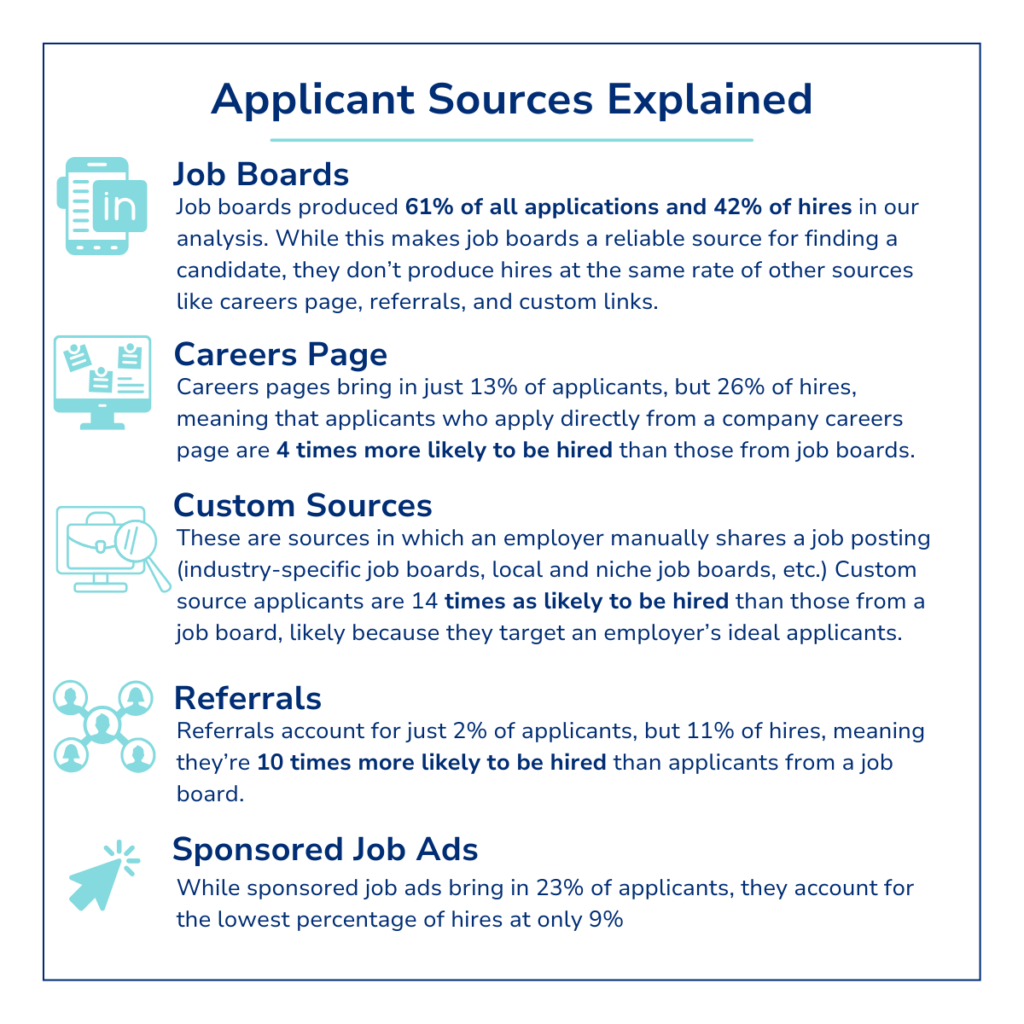In a job seeker’s market, attracting and hiring qualified candidates is more competitive than ever before. As an employer, you may be feeling more motivated to take a closer look at your hiring process and make sure you’re competing at a high level!
Just as marketers and sales teams keep up with key performance indicators (KPIs), it’s important for employers to monitor how their recruitment efforts are doing by looking at the data. Learning how to track your recruiting metrics can help you make the necessary adjustments to your hiring process to optimize your recruitment funnel from start to finish.
This means an improved ability to hire the right people quickly.
So which numbers should you be paying attention to? And what adjustments can you make when your recruitment process isn’t meeting those performance goals?
In this blog, we’ll touch on some of the main recruiting metrics to monitor and what those metrics can tell you about your hiring process.
What are recruiting metrics?
Every year, we use hiring data from our clients to create a Recruiting Metrics Report. This report establishes benchmark data for ten different industries, and gives us a pulse on trends in the hiring landscape.
Analyzing the data can be insightful and help other businesses improve their hiring processes. Metrics like this can also be extremely useful when businesses look at their own unique data individually.
Recruiting metrics are numbers, rates, and data points that show you how your hiring process is performing. They can tell you what’s working and what’s not working in a hiring process so that you can adjust your efforts accordingly.
Recruiting metrics to track while hiring
There are countless metrics that you can track during recruitment, but here are some of the most important numbers to monitor.
Applicant and hire sources
One important metric to keep an eye on is applicant sources. This means paying attention to where your applicants are coming from (like Indeed, Craigslist, your careers page, etc) and which sources are bringing you the best results. Keep in mind that applicant quality is more important than quantity, so not only will you want to track sources of applicants, you’ll want to track which sources are actually bringing you hires.
Our data shows that applicants that come from careers pages are 4 times more likely to be hired than those from job boards and applicants that come from custom sources (like industry-specific, niche, and local job boards) are 14 times more likely to be hired than those from a job board.
Knowing which sources are bringing you the highest quality applicants can help you focus your efforts there.

Applicant conversion rates
Many employers want to know how many applicants it takes to make one hire, but that’s a tricky question to answer without looking at a few other variables. There are a few different conversion rates you’ll want to consider throughout the recruitment process from job posting to onboarding. Let’s explore those now.
Click-to-apply rate
Your applicant conversion, or click-to-apply rate, is calculated by taking the number of applicants you receive for a job divided by the number of views you receive on your job posting. You may be wondering: What’s a good click-to-apply rate? We recommend taking a look at what this rate has been in the past for your company as a benchmark for your current postings.
This number tells you how many people are abandoning your job posting without applying. If this number is high, you might consider reworking your job description to entice more job seekers to submit an application.
Here’s a video from our Senior Director of People, Natalie Morgan on creating a good job posting:
Application-to-interview and interview-to-hire rate
Many employers want to know how many applicants it takes to make one hire. But that’s a tricky question to answer without looking at a few other variables:
- The applicant-to-interview conversion rate
- The interview-to-hire conversion rate
Employers in our study received an average of 180 applicants per hire made, this is up from last year, when it took employers an average of 93 applications per hire. When we examine the hiring funnel by stage, we see that employers invited an average of just 3% of applicants to interview for their open roles, but were far more efficient later in the hiring process, converting 27% of interviews to hires.
This suggests that employers don’t necessarily need more applicants at the top of their funnels to make their hires – they just need to convert applicants to interviews and interviews to hires at slightly higher rates in order to hire effectively.
Remember, you aren’t trying to win an award for most applicants received. You just need to make the right hire for your team. Tracking your applicant-to-interview and interview-to-hire rates can help you monitor how you’re doing further down the funnel.
Average days to contact
Job seekers have more options than ever before, and the speed of your hiring process matters. In fact, 37% of entry-level and hourly workers listed being hired quickly as the most important factor when job seeking.
Plus, our own original research found that an employer’s responsiveness after initially applying influenced their decision to accept an offer and is a major factor in creating a great candidate experience.
The metrics that matter here are the average time it takes to contact applicants and how long it takes to contact a candidate that you want to hire. These numbers are very important to keep track of and to improve if necessary. One way to improve your communication in the hiring process is by using text recruiting, a feature available in CareerPlug’s software. Text recruiting can not only make hiring easier, but our clients see a 32% faster time-to-hire rate with text recruiting.
Time to hire
Time to hire is an overall metric for how long it takes to complete your entire hiring process from the initial job posting to an accepted offer. This information can be useful because it can give you an idea of how long it might take to fill similar open roles in the future.
In 2023, the average time to hire was around 17 days. In 2024, it took employers even longer: around 20 days. We recommend trying to shave this number down quite a bit and making a hire within 5 days.
It’s important to have a documented and consistent hiring process to keep things moving along quickly. Still, roles that require multiple interviews, test projects, background checks, and other steps will obviously increase your time to hire.
Some ways to speed up your hiring process? Include pre-screen questions in your application to fast track higher quality candidates. Automate your interview scheduling, and use templates where possible, like when sending an offer letter or polite rejection.
Importance of marking hires
Once you’ve finished the recruiting process, one final step is to track your hires. If you’re using an applicant tracking system like CareerPlug, this means, marking an applicant as “hired” and moving them to the onboarding process. Monitoring your hire and termination rates help you determine your overall rate of retention—another important metric for every business owner!
Jenny Leman, President of CareerPlug shares, “Small business owners can’t afford to guess when it comes to employee turnover. Tracking hires and terminations isn’t just about keeping records—it’s about understanding the true cost of turnover and identifying opportunities to improve retention. Every lost employee represents lost productivity, hiring expenses, and training costs. By measuring hires made and turnover trends, businesses can make better decisions to strengthen culture, reduce costs, and build a more stable, engaged workforce…. thereby, improving profitability.”
The new CareerPlug Grow Plan will include a team directory where employers can track employee status including hiring and termination, giving them the ability to measure and improve employee retention rates.
Take action
Building a great hiring process can make for smoother recruitment. Automating that process with CareerPlug can make it even easier to hire the right candidates quickly. Additionally, our software can help you and your team run detailed reports and keep track of recruiting metrics so that you can see what’s working and what’s not.
You don’t have to be a professional recruiter to analyze your recruiting metrics and improve your hiring process. Paying attention to these numbers and setting your own benchmarks can help you make the right hires even in today’s competitive market.

Download the 2025 Recruiting Metrics Report
See our benchmark data and compare your hiring metrics with others in your industry. Plus, we share our best hiring tips for building a team that sticks around.
Download my free copy